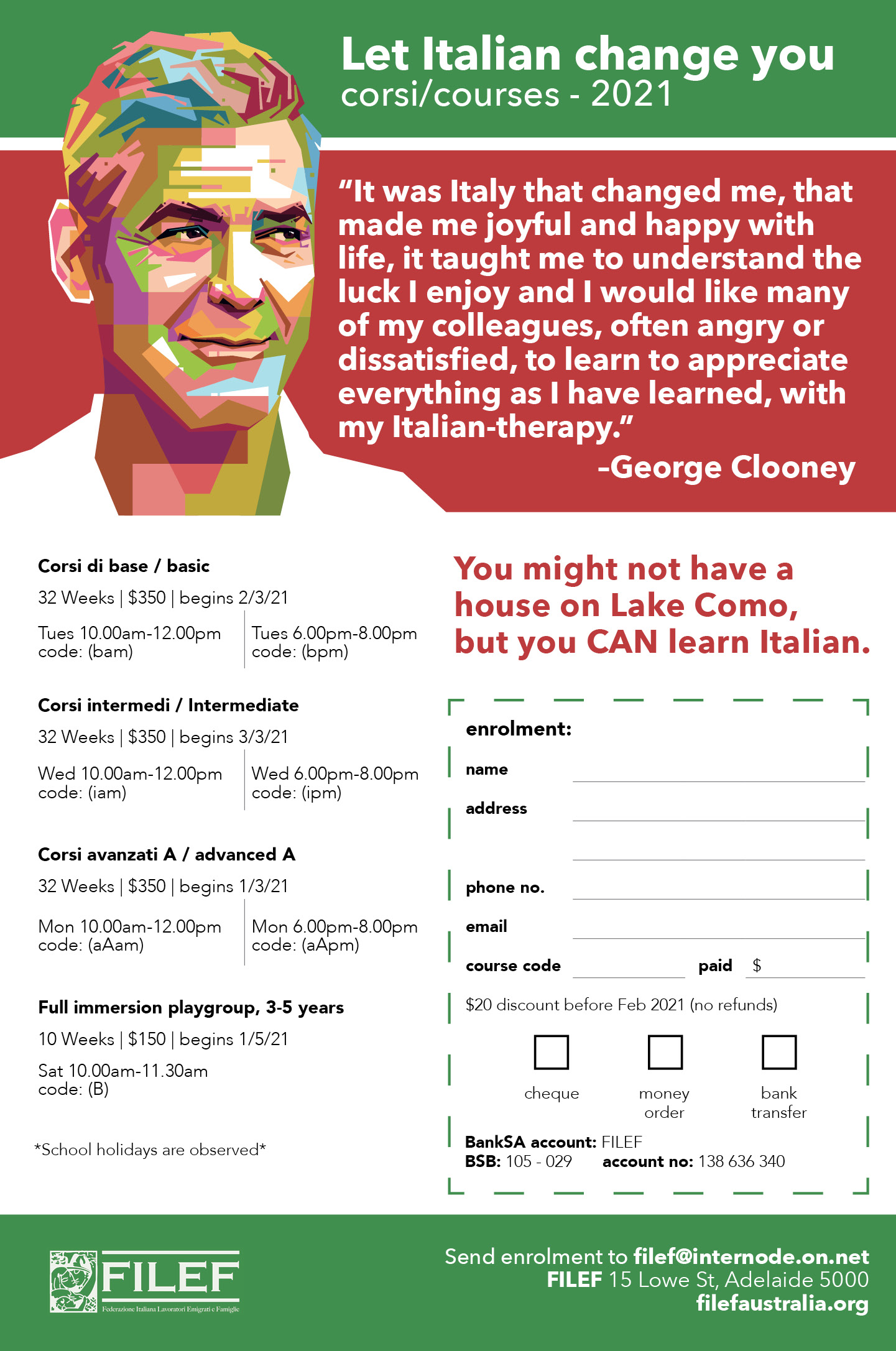Author: Sonja Sedmak

How should antisemitism be defined? A reply to Peter Wertheim

Peter Wertheim, the co-director of the Executive Council of Australian Jewry (ECAJ), has argued that “there is no credible alternative” to the working definition of antisemitism formulated by the International Holocaust Remembrance Alliance (IHRA). On the contrary, the definition is itself problematic and has been widely opposed.
Chairman of the IHRA Committee on Antisemitism and Holocaust Denial, Mark Weitzman, notes that the concern to clarify antisemitism “is not a simple question” and has defied the efforts of scholars in history, philosophy, religion, and political science in a vast academic literature. However, for our purposes, it is not necessary to resolve this difficult question in order to recognise serious shortcomings of the definition that has been proposed.
It is worth pointing out that even the author of the IHRA definition, Kenneth Stern, though himself a Zionist, has expressed his concern about the “McCarthy-like” use of the definition, which he says is being “weaponized” by right wing Jews “to suppress — rather than answer — political speech.” Stern acknowledges that if he “had been born into a Palestinian family displaced in 1948”, he might have a different view of Zionism, “and that need not be because we vilify Jews.”
What of the IHRA definition itself? It states:
Antisemitism is a certain perception of Jews, which may be expressed as hatred toward Jews. Rhetorical and physical manifestations of antisemitism are directed toward Jewish or non-Jewish individuals and/or their property, toward Jewish community institutions and religious facilities.
The Canadian organisation Jewish Voices for Peace (JVP) has argued that the definition is “so vague and incomplete that it is hard to disagree with it”, but for that reason “it is equally useless” in identifying incidents of antisemitism. Of course, JVP acknowledges that antisemitism is a real problem which must be opposed in all its forms. But they insist that the IHRA definition is not the right way to do it. JVP believes that the primary goal of those promoting the definition is to divert attention from Israel’s crimes and “to ban or criminalize criticism of both Israel and Zionism, along with support for Palestinian rights.”
In the same vein, a report by Geoffrey Robertson QC claims that the IHRA definition is liable to suppress legitimate criticism of human rights abuses against Palestinians by defaming critics of Israel as antisemitic. Likewise, in 2017 dozens of academics signed a statement condemning the uses of the IHRA definition to silence discussion of Israel’s violation of Palestinian rights under the pretext of “concern about antisemitism.”
Among the examples of antisemitism — as per the IHRA definition — that Peter Wertheim identifies, is to deny Jewish people their right to national self-determination. And yet, as Peter Beinart has argued, this as a “tragic mistake” because this makes anti-Zionism Jew-hatred by definition. Jews are not alone in being denied national self-determination, but nobody suggests that opposing a Catalan or Québécois state makes you an anti-Catalan or anti-Québécois bigot. Analogously, Beinart argues, anti-Zionism is not inherently antisemitic because it is not bigotry to turn a state based on ethnic nationalism into one “in which no ethnic group enjoys special privileges.” As he puts it:
Anti-Zionism is not inherently antisemitic — and claiming it is uses Jewish suffering to erase the Palestinian experience. Yes, antisemitism is growing. Yes, world leaders must fight it fiercely. But in the words of [Arthur Hertzberg], “This is not the way”.
Beinart’s call to renounce the idea of an ethnically pure Jewish state in favour of a multi-ethnic one has provoked an “earthquake” of outrage. In response to Beinart’s argument against a “two-state solution”, Alan Dershowitz has charged him with “historical ignorance, wilful deception and arrogant rejection of democracy” and even suggested that Beinart is seeking the “final solution” for Jews.
Another detractor, Daniel Gordis, draws an analogy between Beinart’s argument and Holocaust denial:
there are certain fundaments of Jewish history that are not discussable. Happy to discuss annexation; happy to discuss occupation; happy to discuss whether to call it West Bank or Judea and Samaria; happy to discuss how brutal or not brutal the Israeli occupation has been … but when you say that the first thing in 2,000 years that has kept the Jewish people safe ought to be destroyed not by the Arabs, but by the Jews themselves, then I think you’re a traitor. I think you’re a traitor to the Jewish people …
Wertheim acknowledges that not all critics of Israel are antisemitic, and writes, “The serious charge of antisemitism should never falsely be made in order to stifle political debate.” But is this anything more than an empty gesture when the IHRA definition creates a presumption that criticism of Israel is antisemitism rather than political disagreement?
Wertheim claims that supporters of boycott, divestment, and sanctions (BDS):
typically react with indignation when their views are denounced as antisemitic. They tell us it’s not racist to criticise the policies of any government, or to speak up for human rights; that some Jews (albeit a tiny minority) support BDS, so BDS can’t be antisemitic; that it cannot be racist to state a fact, and it’s a fact, so they tell us, that Israel is an apartheid State.
However, nobody denies some critics of Israel might be motivated by Jew-hatred, but to deserve the label “antisemitic” there must be evidence of racist prejudice. Of course, charges of antisemitic motives will appear more plausible if relevant political considerations are omitted.
Relevant considerations here include the fact that, according to Amnesty International and the human rights organisation B’Tselem, there are around 600,000 illegal settlers in Palestinian territories (counting 200,000 Israelis in occupied East Jerusalem). They include the fact that ten per cent of the West Bank is annexed by an enormous wall, in violation of the Geneva conventions and in defiance of the International Court of Justice in 2004. It is also relevant that since 1967, more than 8,000 unarmed Palestinians have been killed by Israeli forces in the West Bank, including nearly 2,000 children (an average of two children a week). It is relevant that over 50,000 houses have been demolished since 1967 and a million olive trees have been destroyed. Amnesty International reports that water is stolen for Jewish settlements, and Palestinians endure daily humiliation at hundreds of checkpoints as part of Israel’s oppressive “matrix of control.”
Relevant considerations also include Israel’s crushing blockade of Gaza since 2007, which the United Nations has called a “war crime”, and which the International Committee of the Red Cross (ICRC) has condemned as constituting the “collective punishment” of the two million Palestinians who remain under what Yoram Dinstein has described as Israel’s “belligerent occupation”. This chorus of condemnations of Israel’s conduct in Gaza has been joined by Sara Roy, Max Blumenthal, Gideon Levy, and Norman Finkelstein. These denunciations of Israel’s devastating, disproportionate military assaults on Gaza cannot plausibly be ascribed to antisemitism.
Nor can recent concern over the shooting deaths of 200 unarmed Gaza protesters by Israeli snipers. In 2018, the United Nations Office for the Coordination of Humanitarian Affairs (OCHA) reported that “large number of casualties among unarmed Palestinian demonstrators, including a high percentage of demonstrators injured by live ammunition, has raised concerns about excessive use of force by Israeli troops.” Amnesty International commented that a report prepared by the United Nations Independent Commission of Inquiry on the protests in the Occupied Palestinian Territory “paints a damning picture of Israeli forces who deliberately shot at children, health workers, journalists, and people with disabilities, demonstrating a cruel and ruthless disregard for international humanitarian law.” Can such criticism plausibly be attributed to antisemitism?
A further example of antisemitism offered by Wertheim is the claim “that the existence of a State of Israel is a racist endeavour — for example, by smearing Israel as an ‘apartheid State’.” Wertheim says, “this is a way of denying the legitimacy of a Jewish State and thus denying Jewish people their right to national self-determination.” Furthermore, Wertheim claims, “All of Israel’s citizens, Jews, Arabs and others, have equal voting, civil and religious rights” — hardly an “apartheid State.” But the realities on the ground tell a different story.
In July 2018 Israel enacted its “Nation-State Law”, which defines Israel as “the historical homeland … [and] the nation state of the Jewish People”, and stipulates that the “exercise of the right to national self-determination in the State of Israel is unique to the Jewish People.” In fact, this law simply codified the pre-existing system of discrimination against the twenty per cent of Israeli citizens who are Palestinian. Indeed, a 2017 report by former United Nations Human Rights Rapporteur Richard Falk and Virginia Tilley found that the treatment of Palestinians corresponds precisely with the definition of apartheid under international law. Back in 2010, one of the more unlikely candidates for the charge of antisemitism, Henry Siegman, former director of the American Jewish Congress and the Synagogue Council of America, wrote:
Israel’s relentless drive to establish “facts on the ground” in the occupied West Bank … seems finally to have succeeded in locking in the irreversibility of its colonial project. As a result of that “achievement”, one that successive Israeli governments have long sought in order to preclude the possibility of a two-state solution, Israel has crossed the threshold from “the only democracy in the Middle East” to the only apartheid regime in the Western world …
Wertheim claims that the IHRA definition corresponds with the way “antisemitism is understood by the vast majority of Jewish people”, who are “the best qualified by history and experience to recognise it when they see it.” But this criterion is also unsatisfactory, for reasons set out by the former Dean of UNSW Law School and Judge of the Federal Court of Australia, Ronald Sackville AO QC. The criterion relies on the likely subjective perceptions of Jews rather than “more or less objective standards.” Moreover, this standard ignores the intense political and ideological pressure that is often brought to bear among Jewish communities. Peter Beinart points out that Jewish leaders frequently “serve both as defenders of local Jewish interests and defenders of the Israeli government.” Indeed, ECAJ evidently fits this description, insofar as it claims to “represent the interests of the Australian Jewish community”, but frequently engages in pro-Israel lobbying and advocacy.
Surely, among those prominent Jews who can “recognise [antisemitism] when they see it” is the American historian Norman Finkelstein, who is the son of Holocaust survivors and among the foremost scholarly critics of Israel. Perhaps we should heed Finkelstein’s warning from 2006, that “the real enemies of the Jews” are “those who debase the memory of Jewish suffering by equating principled opposition to Israel’s illegal and immoral policies with anti-Semitism.”
Peter Slezak is Honorary Associate Professor in Philosophy at the University of New South Wales, co-founder of Independent Australian Jewish Voices and Executive Member of the Australia Palestine Advocacy Network.

Nuovo Paese dicembre/december 2020
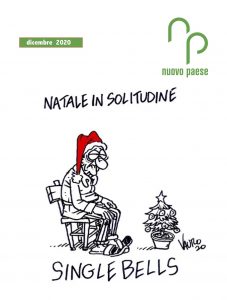 editoriale
editoriale
COVID-10 scopre i contanti
editorial
COVID-10 uncovers the cash
Immigrants turned Activists: Italians in 1970s Melbourne
Simone Battiston, Swinburne University of Technology
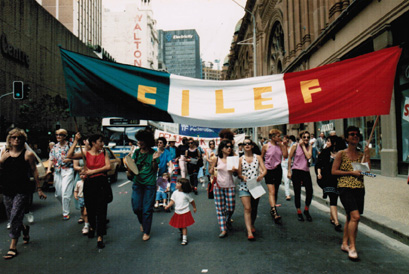
What do Australian celebrity chef Stefano de Pieri, former Labor state MP Giovanni Sgro, and the late SBS Italian Radio host Umberto Martinengo have in common? They are all Italian immigrants who became political militants, along with several hundreds more, in left-wing organisations and parties before or throughout the 1970s in Melbourne, a key period of Australian political history in the post-Second World War period. This book offers a unique insight into the life trajectories of politically active Italian immigrants and their left-wing grassroots organisations. It does so in the light of fresh archival data and a string of oral accounts gathered from former and current members and collaborators of leading left-wing organisations, such as the Italian Federation of Migrant Workers and Their Families (FILEF). This study, which portrays successful pro-migrant lobbying as well as organisational failures and political sectarianism, is a telling example of the political potential and limits of immigrant activism in Australia.
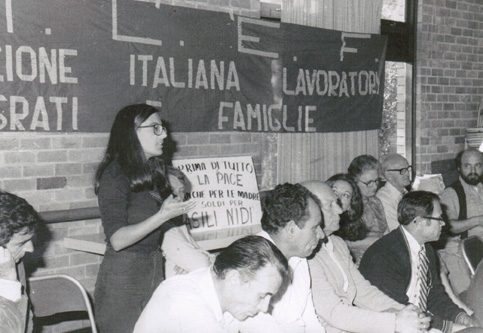
Migrant radicalism and activism in Australia: the transnational experience of Pierina Pirisi
Journal of Australian Studies, 43(2): 160-173, 2019
Simone Battiston
Published online: 14 May 2019
This article examines the transnational experience of Italian-born Pietrina (“Pierina”) Pirisi, who took an active part in the communist and ethnic rights movements in Australia from 1972 until her return to Italy in 1984. For Pierina, the paths of migration, radicalism and activism intertwined when she moved from her native Sardinia to Sydney and joined the Communist Party of Australia, the Italian Communist Party in Australia, and the Italian Federation of Migrant Workers and their Families. Before emigrating, Pierina had begun developing a radical political awareness, which migration only strengthened. Through Pierina’s story, this article expands our understanding and traces the evolution of the involvement in far-left politics and community-based initiatives of newcomers from Italy who had experienced, or had been inspired by, the movements of “1968”. By shuttling between Australia and Italy’s communist experiences, Pierina’s story complicates our understanding of migrant activism, yet it enriches our knowledge by adding transnational, pre- and post-emigration elements to the history of the politicisation of migrants. This article demonstrates the value of a multifaceted approach to historical analysis and interpretation, and the engagement of multiple sources, from immigration and security files to oral history, when examining post-1968 political activism by and for migrants.


RIGHT TO PROTEST
Speakers:
Please RSVP

TALL TREES TALLER FENCES 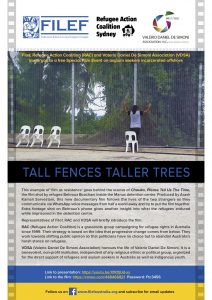
(Password: Ftc3456)
This ‘film as resistance’ goes behind the scenes of Chauka, Please Tell Us The Time, the film shot by refugee Behrouz Boochani inside the Manus detention centre.
Tall Trees Taller Fences is a documentary film produced by Arash Kamali Sarvestani which follows the lives of the two strangers as they communicate via WhatsApp voice messages from half a world away and try to put the film together. Extra footage shot on Behrouz’s phone gives another insight into what the refugees endured while imprisoned in the detention centre.
Representatives of Filef, RAC and VDSA will briefly introduce the film. Link to introduction here
RAC (Refugee Action Coalition) is a grassroots group campaigning for refugee rights in Australia since 1999. Their strategy is based on the idea that progressive change comes from below. They work towards shifting public opinion so that politicians have no choice but to abandon Australia’s harsh stance on refugees.
VDSA (Valerio Daniel De Simoni Association) honours the life of Valerio Daniel De Simoni. It is a benevolent, non-profit institution, independent of any religious ethnic or political group, organized for the direct support of refugees and asylum seekers in Australia as well as indigenous youth.
Password: Ftc3456

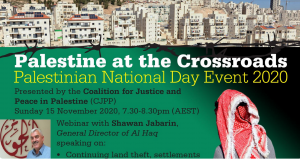
Webinar with Shawan Jabarin, General Director of Al Haq speaking on:
Continuing land theft, settlements and annexation
Israeli deals with UAE, Bahrain and Sudan
the impact of Covid 19 and ongoing Israeli human rights violations

NP novembre 2020
Try the new look NP here – readable link
 Editoriale
Editoriale
READ NUOVO PAESE IN THE MAGAZINE FORMAT – ENJOY A NEW EXPERIENCE

Tell the EU to End Slavery

Freedom United.org

By now you’ve seen the news.
53 migrants and refugees dead in an airstrike.1
Africans being sold off for forced labor.2
Disappearances. Appalling disease.
Detainees being forced to take up arms in the Libyan civil war.3
The world was shocked when news of slave markets in Libya broke two years ago, but since then cases of modern slavery in Libya have evolved considerably. And they are all linked back to migrant detention centers and the money and power fueling their existence.
Amnesty International, Human Rights Watch, and the United Nations have all documented major human rights violations and clear cases of modern slavery in these facilities.
So who’s throwing these vulnerable people behind bars?
The Libyan Coastguard — supported generously by funding from the European Union.4,5
In a bid to prevent refugees and migrants from reaching the shores of Europe, the Libyan Coastguard has increased its interception of boats in the Mediterranean Sea, returning those on board to Libya and locking them up in migrant detention centers.6
And as the devastating, deadly airstrike on the Tajoura migrant detention center shows, these facilities are now targets in the country’s ongoing conflict and no place for refugees to live.
We know racism within Libya is contributing to the problem as well; black and dark-skinned refugees and migrants from Sub-Saharan African are the majority of those trafficked and subjected to forced labor. The United Nations even reported that “a commonly used word to refer to black people in Libya is ‘abidat’, which translates to “slaves.”7
Take it from Leyla, a Somali refugee.
“We barely ate and there wasn’t enough water. So many people were sick with TB, some died in my arms. I was beaten up and we were tortured – with electricity,” she said.8
She and her husband fled Islamist al-Shabab militants in Somalia in 2016 but ended up in the hands of human traffickers in Libya. When they managed to escape their traffickers, the couple boarded an inflatable boat, hoping to cross the Mediterranean.
But when their boat ran out of fuel it was the Libyan Coastguard that forcibly took them to Tripoli, locking them up in the Triq al-Sikka Detention Center. Running out of hope that they would be freed, her husband set himself on fire, burning to death.
We must break this cycle of exploitation.
And that starts with putting pressure on the EU. Telling the EU to put human lives before inhume immigration policies that are sending refugees and migrants back into danger in Libya.
Your signature tells the EU that it can no longer be complicit in allowing modern slavery to persist in Libya. Act now.
Take action by signing here Freedom United.org

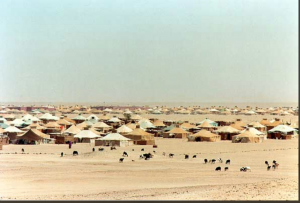
The Australia Western Sahara Association (AWSA) invites you to a special event.
Western Sahara Down Under
Join us with Tecber Ahmed (Head of African Union Department, Ministry of Public Health in the Saharawi Arab Democratic Republic – SADR) Haissam Minkara (Oxfam in Algeria), and Lyn Allison (Former Senator and Leader of the Australian Democrats; President of the Australia Western Sahara Association – AWSA).
Details:
Wednesday, November 18, 20206pm

Deprecated: Function create_function() is deprecated in /home/filefaus/public_html/old/wp-content/plugins/wp-spamshield/wp-spamshield.php on line 1958

“ It wasn’t just a question of what we were paid for our labour, but of what our labour produces. So we raised the issues of socially useful production and consumption. Of course, workers have got to fight for wages and conditions — but they should have a wider vision of what they are making and how it is used. “
With images from Jack’s personal archive and from NSWBLF life member Meredith Burgmann’s collection. Taking us through the post-BLF years as Jack continued to support many campaigns for a better world.
As we face an ecological crisis it is time to remind ourselves how these men and women argued for and took direct action in a way that is so necessary NOW

Trades Hall Monday to Friday 8.30 -5. Wednesdays open until 7.00pm. ntowart@unionsnsw.org.au or https://www.facebook.com/sydneytradeshall Trades Hall entry via 377 Sussex St near Goulburn-Sussex intersection. Tram Stop Chinatown; or walk from Town Hall railway


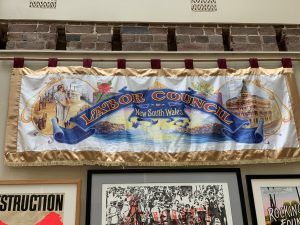
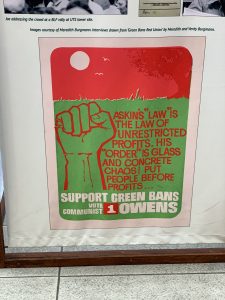
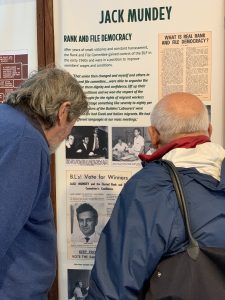
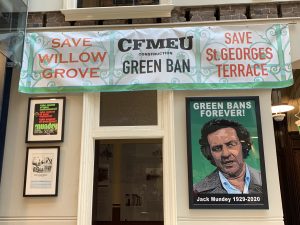

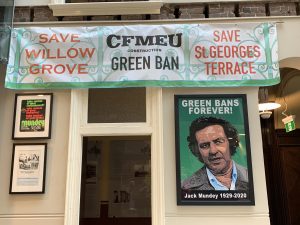


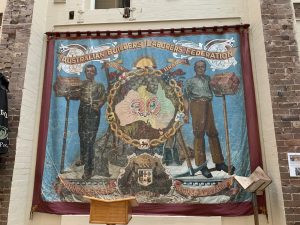
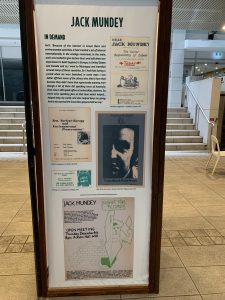
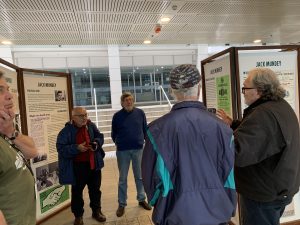

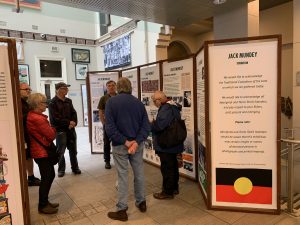


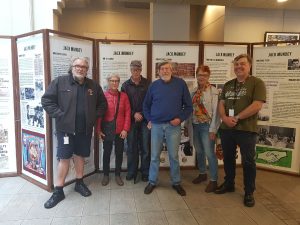








Deprecated: Function create_function() is deprecated in /home/filefaus/public_html/old/wp-content/plugins/wp-spamshield/wp-spamshield.php on line 1958
Manus Prison theory and Australia’s response to asylum seekers
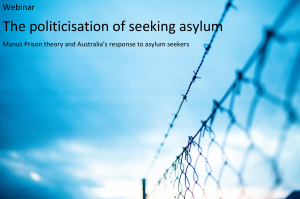 Asylum seekers have occupied a particular place in the Australian national imaginary, particularly in the post-Tampa era after 2001. Over that time, successive Australian governments have pursued a militarised enforcement approach to national borders when it comes to people seeking asylum. This includes the implementation of ‘Operation Sovereign Borders’ – the consolidation of a mandatory offshore detention and processing policy fo
Asylum seekers have occupied a particular place in the Australian national imaginary, particularly in the post-Tampa era after 2001. Over that time, successive Australian governments have pursued a militarised enforcement approach to national borders when it comes to people seeking asylum. This includes the implementation of ‘Operation Sovereign Borders’ – the consolidation of a mandatory offshore detention and processing policy fo
r anyone seeking asylum who arrives by boat and the controversial and dangerous ‘tow-back policy’. There has been a range of policy and legislative changes that have made seeking asylum in Australian more difficult, such as indefinite processing times, denying access to family reunion and government-funded legal assistance, and removing the right to independent reviews of refugee claims, among others. There are also operations that systematically censor information regarding asylum seekers – restricting media access to detention facilities, controlling information flows, and leveraging positions of power to manage the narrative. The most controversial and intractable has been the offshoring of immigration of detention to the countries of Nauru and Papua New Guinea (Manus Island). The symposium will be informed by the Manus Prison theory that has been further developed by the analysis of former Manus detainee Behrouz Boochani and his translator and collaborator, Omid Tofighian.
This interdisciplinary symposium will therefore take an overtly political and innovative conceptual approach to this problem. Honouring, applying and extending the legacy of Behrouz and Omid’s work on Manus Prison theory, the symposium will highlight a body of work that seeks to examine these systems and structures so as to better understand how seeking asylum has been politicised in the Australian context, and what impact this has on Australian society more broadly.
ALL WELCOME
FREE EVENT
Online seminar
Wednesday October 28, 2020 10am-1pm (AEST, Sydney)Register at Eventbrite: https://politicsseekasylum.eventbrite.com.au
KEYNOTE SPEAKER
Alison Mountz, Wilfrid Laurier University
SPEAKERS
Behrouz Boochani, Ngi Tahu Research Centre, Canterbury University/UNSW
Omid Tofighian, UNSW/University of Sydney
Claire Loughnan, University of Melbourne
Andrew Burridge, Macquarie University
Anne McNevin, The New School
Maria Giannacopoulos, Flinders University
Julie Macken, Western Sydney University
PANELLISTS
Claudia Tazreiter (Facilitator), University of New South Wales (UNSW)
Philomena Murray, University of Melbourne
Anthea Vogl, University of Technology Sydney (UTS)
Linda Briskman, Western Sydney University
CONVENORS
Rachel Sharples, Western Sydney University r.sharples@westernsydney.edu.au
Linda Briskman,Western Sydney University l.briskman@westernsydney.edu.au
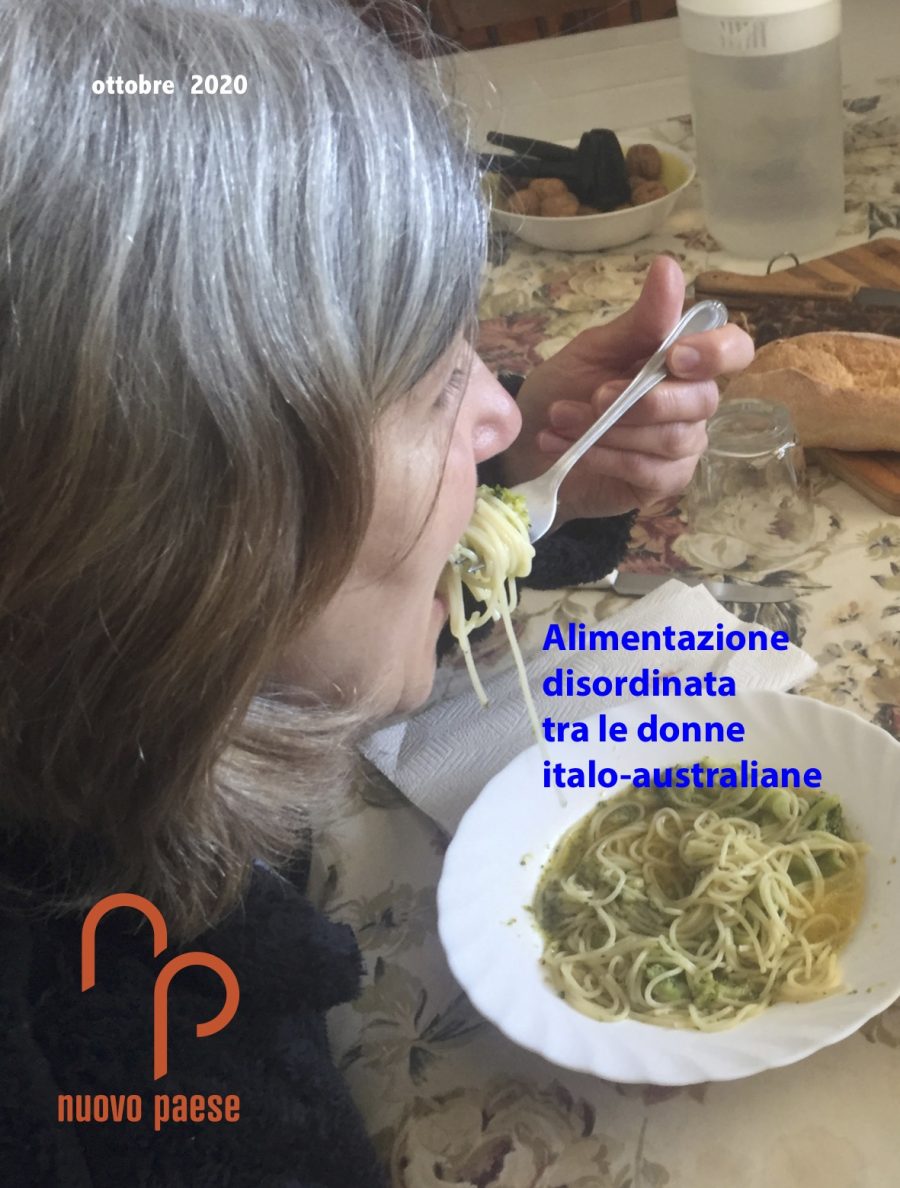
Nuovo Paese ottobre/october 2020
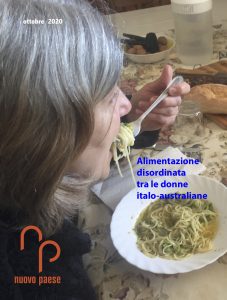
Editoriale
Il prezzo NON è giusto
Editorial
The price is NOT right


BUWARRALA ARYAH Journey West
In the gulf of Carpentaria in Northern Australia, Aboriginal elders lead their community to a traditional walk across Country to re-connect children and youth to their culture.
DIRECTOR: Gadrian Jarwijaimar Hoosan, a Garrwa man who lives in Borroloola, Yanyuwa Country, gulf of Carpentaria. At the age of 12 he had his first experience with filmmaking appearing in the first 1988 documentary Buwarral Agarriya Journey East, active in the music scene, forming the Sandridge Band, and collaborating on documentaries including We Paint We Belong, and Water is Life.
PRODUCERS: Amanda King & Fabio Cavadini of Frontyard Films will present the documentary. They have been a producing and directing since 1987 a string of documentaries focusing on environ- mental and social justice issues in the Pacific and Australia.
CO-PRODUCER: Jason Di Santolo, a Garrwa and Barunggam man, a creative producer, Associate Professor at University of Technology Sydney and a core member of SIC Strengthening Indigenous Communities.
Click the link https://www.youtube.com/watch?v=IcX0Mu9jRrk
to view the film and an introduction by FILEF, Frontyard Films producers Fabio Cavadini and Mandy King and director, Gadrian Jarwijaimar Hoosan, a Garrwa man

